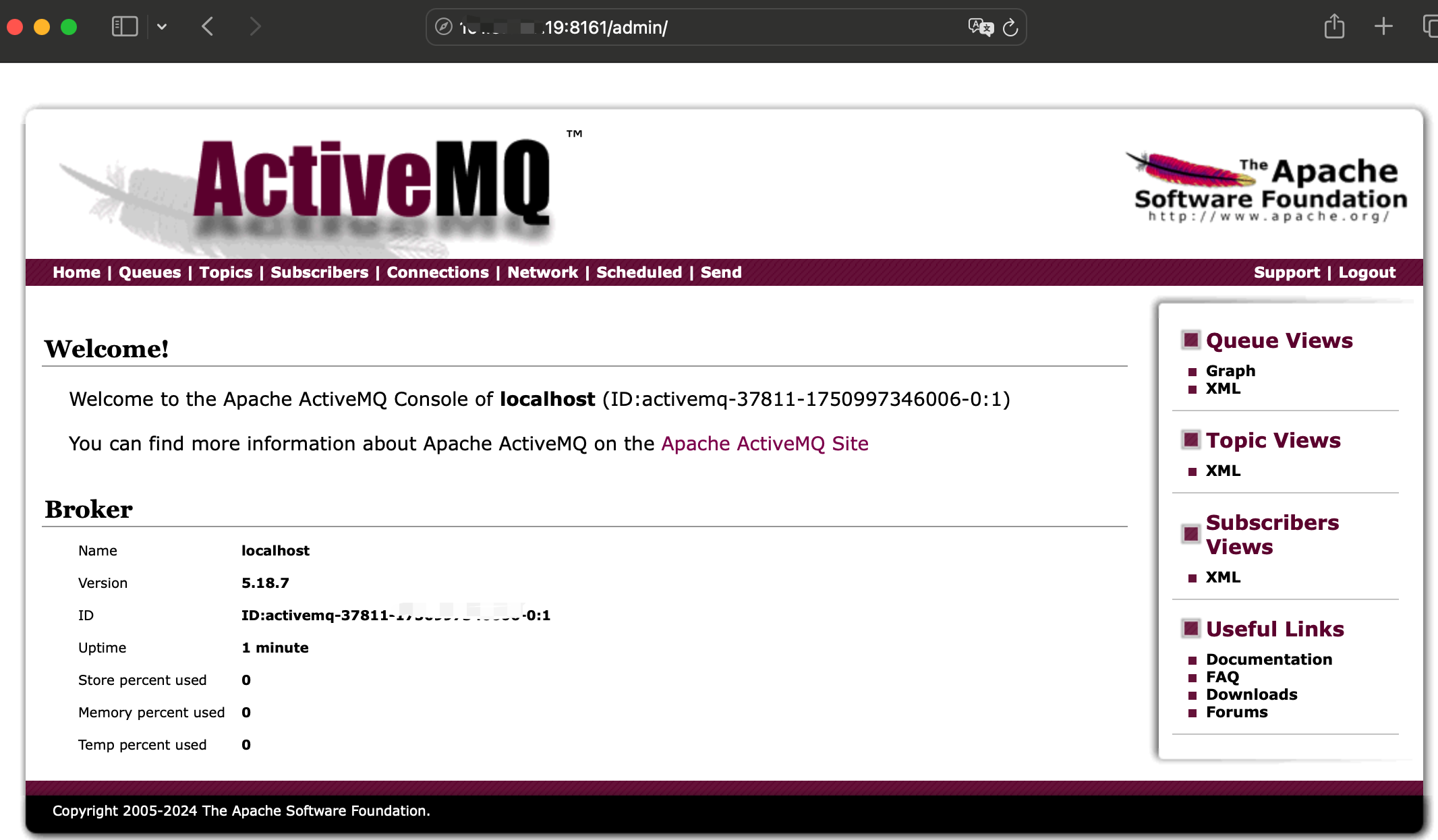ActiveMQ Image Guide
Introduction
ActiveMQ is a popular open-source message middleware developed by the Apache Software Foundation. Implemented in Java, it fully supports the JMS 1.1 and J2EE 1.4 specifications as a JMS Provider. It primarily serves as a message queue for implementing asynchronous communication and decoupling between applications in distributed systems.
By default, network access is turned off to a ECS instance. You can specify rules in a security group that allows access from an IP address range, port, or ECS security group.
You must specify port numbers (for TCP):
- 22 (ssh)
- 61616 (ActiveMQ)
- 8161 (ActiveMQ Web Console)
Alibabacloud Security groups document URL: Alibabacloud Security group
Image environment description
- Container image:
apache/activemq-classic:5.18.7 - Data directory:
/data/activemq - Listening port:
0.0.0.0:61616 - Management address:
http://<public-IP>:8161
View ActiveMQ account information
Different versions of ActiveMQ may have different account information viewing methods.
- 5.18.7
- Latest
cat /opt/bypanel/app/activemq/5.18.7/.env
- ACTIVEMQ_CONNECTION_USER=admin # ActiveMQ Broker username
- ACTIVEMQ_CONNECTION_PASSWORD=password # ActiveMQ Broker password
cat /opt/bypanel/cfg/activemq/5.18.7/jetty-realm.properties
- Format: Username: Password, Role
cat /opt/bypanel/app/activemq/latest/.env
- ACTIVEMQ_CONNECTION_USER=admin # ActiveMQ Broker username
- ACTIVEMQ_CONNECTION_PASSWORD=password # ActiveMQ Broker password
- ACTIVEMQ_WEB_USER=admin # ActiveMQ Web Console username
- ACTIVEMQ_WEB_PASSWORD=password # ActiveMQ Web Console password
Change ActiveMQ Password
The method to change ActiveMQ password may vary across different versions.
- 5.18.7
- Latest
sudo vim /opt/bypanel/app/activemq/5.18.7/.env
- ACTIVEMQ_CONNECTION_USER=admin # ActiveMQ Broker username
- ACTIVEMQ_CONNECTION_PASSWORD=new password # ActiveMQ Broker password
sudo vim /opt/bypanel/cfg/activemq/5.18.7/jetty-realm.properties
- Format: Username: Password, Role
vim /opt/bypanel/app/activemq/latest/.env
- ACTIVEMQ_CONNECTION_USER=admin # ActiveMQ Broker username
- ACTIVEMQ_CONNECTION_PASSWORD=new password # ActiveMQ Broker password
- ACTIVEMQ_WEB_USER=admin # ActiveMQ Web Console username
- ACTIVEMQ_WEB_PASSWORD=new password # ActiveMQ Web Console password
Switch ActiveMQ Version
Default image supports the following versions:
apache/activemq-classic:5.18.7,5.18.7is the version numberapache/activemq-classic:latest,latestis the latest version number6.1.7
Switch ActiveMQ version steps:
Down ActiveMQ container
sudo bypanel down activemq
Delete Old Version Data
sudo rm -rf /data/activemq
Configure New Version
sudo bypanel configure
[root@WeiLiu ~]# sudo bypanel configure
Set language, value range is: [en zh-CN]. please enter the language (default: en):
Set the installation path for bypanel. Please enter the path for bypanel (default: /opt/bypanel):
Set data volume path, please enter the data path (default: /data):
Set timezone, Please enter timezone (default: Asia/Shanghai):
Supported applications: activemq,adminer,anylink,apache,caddy,crproxy,memcached,mongo,mysql,mysql-cron-backup,nacos,nginx,openresty,php53,php54,php55,php56,php70,php71,php72,php73,php74,php80,php81,php82,php83,php84,phpmyadmin,postgresql,rabbitmq,redis,sftpgo,tomcat,zookeeper
Set the startup application, If you add a new application, Please keep the original configuration(e.g., if you add an `zookeeper` application: activemq,zookeeper)
please enter the applications (comma-separated. default: activemq):
Set ActiveMQ version,
value range is: [5.18.7 latest] .
Please enter the version (default: 5.18.7 ): latest
[root@WeiLiu ~]#
Up ActiveMQ Container
sudo bypanel up -d
For management password reference: ActiveMQ account information
Login ActiveMQ Web Console
Access http://<public-IP>:8161 in your browser, then enter username admin and password ********
Security group port 8161 must be opened

ByPanel Documentation
More document URL: README